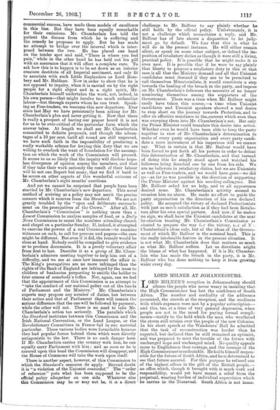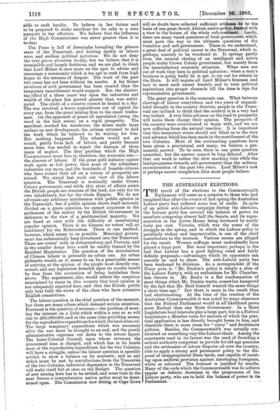LORD MILNER AT JOHANNESBURG. TI ORD MILNER'S reception in Johannesburg should
silence the people who never weary in insisting that the High Commissioner has lost the confidence of South Africa. The number and cordiality of the addresses presented, the crowds at the reception, and the readiness with which expenses were met by a popular subscription— and this, too, at a time of very general depression, when people are not in the mood for paying formal compli- ments—testify to the hold which the man who weathered the storm still retains over the people of the new Colonies. In his short speech at the Wanderers' Hall he admitted that the task of reconstruction was harder than he expected, but declared that lie still remained an optimist, and was prepared to meet the trouble of the future with unchanged hope and unchanged mind. No quality appeals more to Englishmen than courage, and the courage of the High Commissioneris undeniable. He holds himself respon- sible for the future of South Africa, and he is determined to see that future assured. For this purpose he refused one of the highest offices in the gift of the British people,— an office which, though it brought with it much work and responsibility, would yet have meant a relief from the perpetual, wearing burden of individual supervision which he carries in the Transvaal. South Africa is not iusen- Bible, to such loyalty. To believe in her . future and to be prepared to make sacrifices for its sake is a sure passport to her affection. We believe that the influence of the High Commissioner was never greater than it is to-day.
The Press is full of Jeremiahs bewailing the piteous state of the Transvaal, and hinting darkly at labour wars and endless political agitation. We do not deny. the very grave situation to-day, .but we believe that it is terminable and largely fictitious, and we are glad to think that Lord Milner is once more on the spot to advise and encourage a community which is too apt to rush from high hopes to the extreme of despair. The work of the past two years has not been without its results. A far firmer structure of civil government has been created than the temporary unsettlement would suggest. But the shatter- ing effect of a three years' war upon the industries and wealth of the place has proved greater than was antici- pated. The credit of a country cannot be healed in a day. The war involved a heavy expenditure out of capital for every one, from the great mining firm to the small trades- man. On the approach of peace all speculated (using the word in the best sense) on a rapid prosperity. The merchant stocked his warehouse, the mines made large outlays on new development, the artisan returned to find the work which he believed to be waiting for him. But nothing happened. The wheels would not go round, partly from lack of labour, and partly because more time was needed to repair the damage of three years of neglect. The first problem which the High Commissioner must face is, therefore, the economic on,— the absence of labour. If the great gold industry cannot work again at full power, then none of the subsidiary industries can move, and the hundreds of humble citizens who have staked their all on a return of prosperity are ruined. We stated last week our view of the labour question. The Transvaal is nominally under Crown Colony government, and while this state of affairs exists the British people are trustees of the land, not only for its own inhabitants, but for the whole Empire. We do not advocate any arbitrary interference with public opinion in the Transvaal; but if public opinion shows itself seriously divided on a grave question, we cannot acquiesce in the settlement of the matter by the British Government in deference to the view of a problematical majority. We are faced at once with the difficulty of ascertaining popular opinion. There is no Census, no voters' roll, no machinery for the Referendum. There is one method, however, which seems to us possible. Municipal govern- ment has substantially been introduced into the Transvaal. There are voters' rolls in Johannesburg and Pretoria, and in the smaller dorps lists could be readily framed by the Resident Magistrates. The question of the introduction of Chinese labour is primarily an urban one. An urban plibiscite would, as it seems to us, be a practicable means of arriving at the opinion of the people most directly con- cerned, and any legislation founded upon its results would be free from the accusation of being legislation from above. The experiment, also, would relieve the suspicion entertained by many in this country that local opinion is not adequately reported here, and that the British public only hear fully the views of the class who have extensive English connections.
The labour question is the chief question of the moment, but there are many others which demand serious attentions Foremost is the question of revenue,—the problem of meet- ing the interest on a Debt which within a year or so will rise to £65,000,000, and at the same time providing money for the reproductive expenditure for which theland cries out. The large temporary expenditure which was necessary after the war must be brought to an end, and the purely administrative expenses cut down to the lowest figure. The Inter-Colonial Council, upon whose revenues the guaranteed loan is charged, and which has in its hands most of the reproductive expenditure for the two Colonies, will have a struggle, unless the labour question is speedily settled, to show a balance on its accounts; and as any deficit must be met by contributions from the Treasuries of the two Colonies, industrial depression in the Transvaal will make itself felt at once on the Budget. The question of new mining laws has to be settled, and some time in the near future a comprehensive native policy must be deter- mined upon. The Commission now sitting at Cape Town. will no doubt have collected sufficient evidence tis be the basis of one great South African native policyritemed with a view to the future of the whole sub-continent. _ Lastly, there are many vexed. questions of local government, which must pave the way to the ultimate questions of the franchise and self-government. There is, we understand, a great deal of political unrest in the Transvaal, which is, perhaps, scarcely to be wondered at. It springs partly from the natural chafing of an intelligent and active people under Crown Colony government, but mainly from the unsatisfactory economic situation. When men are out of work they turn to political agitation; when a man's, business is going badly he is apt to cry out for reform in the State. It will require all Lord Milner's firmness and tact to meet such unrest frankly, and to turn political aspirations into proper channels till the time is ripe for representative government.
The great question is the economic one. What between shortage of labour everywhere and two years of unparal- leled drought in the country districts, people in the Trans- vaal are inclined to think that the country is in a very bad way indeed. A very little advance on the road to prosperity will make -them change their opinion. The prospects of the country were overcoloured to begin with, and we arc now suffering from the natural reaction. It is important that this temporary stress should not blind us to the very real advance which has been made in the resettlement of the two Colonies. Most of the outstanding questions have been given a provisional, and many, we believe, a per- manent, answer. To be sure, there is one great question unsettled, but the answer cannot be long delayed. After' that our work is rather the slow marking time while the land progresses towards self-government than the arduous reconstruction of the past two years. Lord Milner's task is perhaps nearer completion than most people believe.







































 Previous page
Previous page